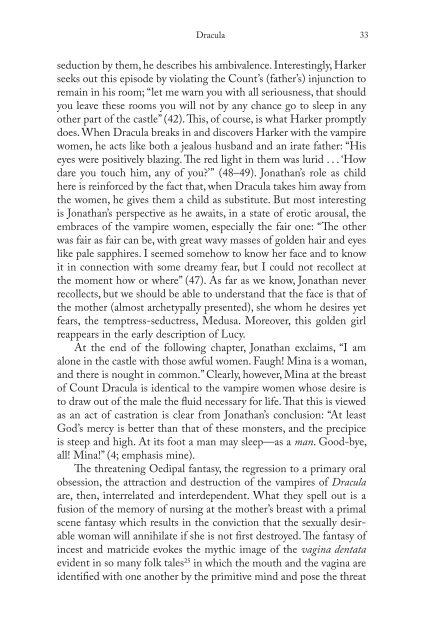Bloom's Literary Themes - ymerleksi - home
Bloom's Literary Themes - ymerleksi - home
Bloom's Literary Themes - ymerleksi - home
Create successful ePaper yourself
Turn your PDF publications into a flip-book with our unique Google optimized e-Paper software.
Dracula 33<br />
seduction by them, he describes his ambivalence. Interestingly, Harker<br />
seeks out this episode by violating the Count’s (father’s) injunction to<br />
remain in his room; “let me warn you with all seriousness, that should<br />
you leave these rooms you will not by any chance go to sleep in any<br />
other part of the castle” (42). This, of course, is what Harker promptly<br />
does. When Dracula breaks in and discovers Harker with the vampire<br />
women, he acts like both a jealous husband and an irate father: “His<br />
eyes were positively blazing. The red light in them was lurid . . . ‘How<br />
dare you touch him, any of you?’ ” (48–49). Jonathan’s role as child<br />
here is reinforced by the fact that, when Dracula takes him away from<br />
the women, he gives them a child as substitute. But most interesting<br />
is Jonathan’s perspective as he awaits, in a state of erotic arousal, the<br />
embraces of the vampire women, especially the fair one: “The other<br />
was fair as fair can be, with great wavy masses of golden hair and eyes<br />
like pale sapphires. I seemed somehow to know her face and to know<br />
it in connection with some dreamy fear, but I could not recollect at<br />
the moment how or where” (47). As far as we know, Jonathan never<br />
recollects, but we should be able to understand that the face is that of<br />
the mother (almost archetypally presented), she whom he desires yet<br />
fears, the temptress-seductress, Medusa. Moreover, this golden girl<br />
reappears in the early description of Lucy.<br />
At the end of the following chapter, Jonathan exclaims, “I am<br />
alone in the castle with those awful women. Faugh! Mina is a woman,<br />
and there is nought in common.” Clearly, however, Mina at the breast<br />
of Count Dracula is identical to the vampire women whose desire is<br />
to draw out of the male the fluid necessary for life. That this is viewed<br />
as an act of castration is clear from Jonathan’s conclusion: “At least<br />
God’s mercy is better than that of these monsters, and the precipice<br />
is steep and high. At its foot a man may sleep—as a man. Good-bye,<br />
all! Mina!” (4; emphasis mine).<br />
The threatening Oedipal fantasy, the regression to a primary oral<br />
obsession, the attraction and destruction of the vampires of Dracula<br />
are, then, interrelated and interdependent. What they spell out is a<br />
fusion of the memory of nursing at the mother’s breast with a primal<br />
scene fantasy which results in the conviction that the sexually desirable<br />
woman will annihilate if she is not first destroyed. The fantasy of<br />
incest and matricide evokes the mythic image of the vagina dentata<br />
evident in so many folk tales 25 in which the mouth and the vagina are<br />
identified with one another by the primitive mind and pose the threat
















